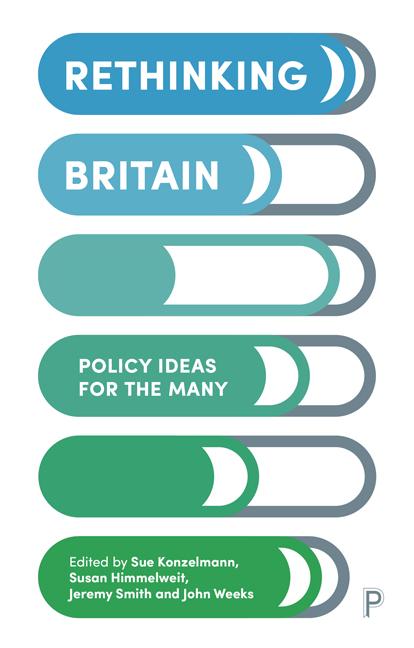Book contents
- Frontmatter
- Contents
- List of Tables and Figures
- The Contributors
- Foreword
- Introduction
- Interlude: ‘Mirror, Mirror, On the Wall – Who has the Highest Debt of All?’
- Part One Building a Full-Employment Economy: Introduction
- Part Two Public Investment – Prioritising Society Rather than Profit: Introduction
- Part Three Making Finance Work for Society: Introduction
- Part Four Genuine Social Security: Introduction
- Part Five How to provide for Social Needs: Introduction
- Conclusion
- Jargon Busters
- References and Further Reading
- Index
2 - Using the Budget to Manage Output and Employment
Published online by Cambridge University Press: 11 March 2021
- Frontmatter
- Contents
- List of Tables and Figures
- The Contributors
- Foreword
- Introduction
- Interlude: ‘Mirror, Mirror, On the Wall – Who has the Highest Debt of All?’
- Part One Building a Full-Employment Economy: Introduction
- Part Two Public Investment – Prioritising Society Rather than Profit: Introduction
- Part Three Making Finance Work for Society: Introduction
- Part Four Genuine Social Security: Introduction
- Part Five How to provide for Social Needs: Introduction
- Conclusion
- Jargon Busters
- References and Further Reading
- Index
Summary
What's the issue?
After the UK economy showed recovery in 2009 and early 2010, eight years of austerity policies by Conservative governments brought recession, stagnation and faltering growth. Various excuses offered by Tory politicians, from world market instability to Brexit anxieties, fail to conceal the basic cause of this historically dismal economic performance. In the foreseeable future it will be the responsibility of a different government to manage rationally the economy.
What policy framework will a future government use to maintain a high and stable level of employment and output?
Analysis
Much of the public and many politicians believe that commitment to match public revenue with public expenditure represents a sensible, sound and achievable fiscal policy. This generally accepted fiscal balance rule (FBR) gives rise to several sources of disagreement: (1) when and how rapidly to achieve it; (2) what specific measure of the budget requires balancing; and (3) what policies the government should apply to bring the balance about.
This deficit obsession of Tory governments makes all public expenditure policy captive to hitting the zero overall fiscal balance, or overshoot into surplus. Until recently the repeated failures to achieve fiscal targets did not weaken the grip of this extreme version of the FBR over the public mind and the media.
Even the Institute for Fiscal Studies focuses on the minutiae of the fiscal deficit rather than critiquing the ideology of the budget balancing. Even worse, Tory chancellors suffer criticism for not eliminating borrowing, although doing so would provoke recession. The responsible approach to this fiscal mismanagement is not to bicker over the likely success of reaching a balanced public budget, but to label the policy for what it is – pernicious nonsense.
Tory success in inculcating belief in the virtue of balanced budgets has proved so ideologically successful that it compels all politicians to commit to some balancing rule. By contrast, the Labour Shadow Chancellor, John McDonnell, proposed a flexible and non-ideological variation. The McDonnell budget guideline commits the Treasury to balancing current (that is, non-capital investment) expenditure and revenue as a targeted outcome of policies to maintain a high level of employment and output, not as a goal that overrides all other policies.
- Type
- Chapter
- Information
- Rethinking BritainPolicy Ideas for the Many, pp. 19 - 23Publisher: Bristol University PressPrint publication year: 2019



